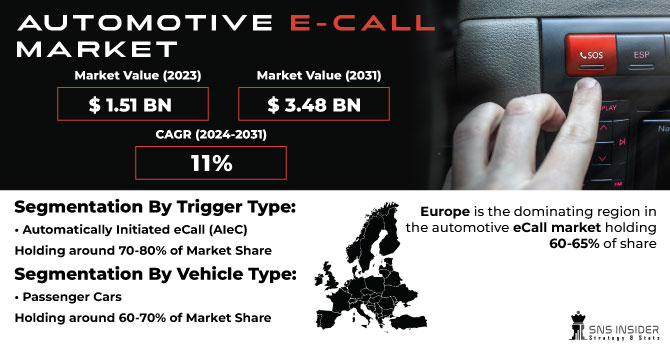
The Automotive e-Call Market is experiencing significant growth due to a confluence of factors, including increasingly stringent safety regulations, rising consumer demand for advanced safety features, and a growing focus on connected car technology. This market is expected to reach a valuation of USD 3.48 Billion by 2031, reflecting a compound annual growth rate (CAGR) of 11% from 2024 to 2031.
Market Scope
In-vehicle emergency call systems, or eCall, provide a vital communication link during accidents or breakdowns. They can be automatic, triggering a call to emergency services based on events like airbag deployment, or manual, with a button for occupants to directly connect for help. The European Union’s 2018 mandate for eCall in new cars has significantly boosted the market. With stricter safety regulations expected globally, eCall adoption is poised for further growth.
Get a Free Sample PDF Copy of the Latest Research @ https://www.snsinsider.com/sample-request/1043
Market Trends
The auto industry is constantly improving connectivity, safety features, and in-car entertainment. Standalone eCall systems can be costly, so manufacturers are bundling them with other telematics and infotainment features for a more complete package. Additionally, integrating 4G and 5G technology into eCall is a major trend. This allows for faster, more reliable data transmission, enabling quicker emergency response times and potentially saving lives. Leading companies are actively working on incorporating these next-gen technologies.
Market Analysis
A booming automotive industry, fueled by rising urbanization and disposable income, is driving demand for eCall systems. Consumers prioritize safety, and eCall offers immediate help in emergencies. Manufacturers are integrating eCall as standard to meet evolving regulations and safety demands. Stringent government regulations, like the UAE’s eCall mandate for new vehicles, further push adoption. These regulations often target high-performance and popular car segments, further accelerating eCall’s integration in the global automotive market.
Segment Analysis
By Trigger Type
The Automatically Initiated e-Call (AIeC) segment dominates the market with a share of around 70-80%. This is because AIeC offers a critical advantage during emergencies when occupants are unable to call for help themselves. It automatically triggers based on accident severity and transmits vital data to emergency services, potentially saving lives.
By Vehicle Type
Passenger Cars hold the largest market share (around 60-70%) due to their higher production volume compared to commercial vehicles.
By Propulsion Type
Internal Combustion (IC) Engine Vehicles currently dominate the market (around 80-90%) as they still comprise the majority of cars on the road. However, with the rising popularity of Electric Vehicles (EVs), e-Call adoption in this segment is expected to surge in the coming years. As EV technology advances and safety regulations adapt, e-Call will be a crucial feature for both segments.
Disruptions from War and Economic Downturn Threaten Automotive e-Call Market Growth
The war in Ukraine has cast a shadow on the automotive eCall market. Sanctions and economic fallout have significantly reduced Russian car production, a major pre-war e-Call market, leading to a sharp decline in demand for the systems. The war also exacerbated global supply chain issues, particularly for wiring harnesses, a key e-Call component often sourced from Ukraine. This has resulted in production slowdowns and potential shortages for e-Call systems in other regions. Rising oil prices due to the conflict may further dampen e-Call adoption as consumers prioritize fuel efficiency over advanced safety features in some markets.
Economic downturns pose another threat to e-Call market growth. Consumers may delay car purchases or opt for cheaper models without eCall, directly reducing demand for new vehicles with these systems. Additionally, economic hardship can force automakers to cut costs, potentially leading to delays in e-Call implementation or lower quality components. Furthermore, economic downturns can strain government budgets, hindering initiatives that promote eCall adoption or standardization. The combined effect of these factors could lead to a stagnation or even decline in eCall market growth of 5-10% during an economic downturn.

Automotive e-Call Market
Enquiry or Share Your Questions If Any Before Purchasing This Report @ https://www.snsinsider.com/enquiry/1043
Key Regional Developments
Europe
Europe dominates the automotive e-Call market with a commanding share of 60-65%. This dominance is primarily due to its long-standing commitment to road safety. The adoption has increased significantly due to strict rules such as mandatory e-Call systems in new cars. Additionally, Europe’s strong focus on advanced driver-assistance systems (ADAS) creates a supportive environment for e-Call technology to thrive.
North America
North America holds the second-highest position in the market with a well-established automotive industry and growing consumer demand for safety features. While regulations aren’t as stringent as in Europe, major car manufacturers are actively integrating e-Call due to consumer interest and potential future mandates.
Asia Pacific
The Asia Pacific region is the fastest-growing market due to skyrocketing car ownership. Rising disposable income and increasing safety concerns are fueling the demand for advanced features like e-Call. Government initiatives promoting eCall adoption in this region are further accelerating its growth.
A Competitive Landscape: Key Players in the Automotive e-Call Market
The automotive e-Call market boasts a roster of prominent players including established names like Continental AG, STMicroelectronics, Infineon Technologies, Texas Instruments, and Thales Group. These giants are joined by automotive specialists like Valeo and Robert Bosch GmbH. Additionally, technology providers such as U-blox and Telit Communications contribute their expertise. Notably, Delphi Automotive and Fujitsu were also key players, although the landscape may have evolved since the data was collected. This mix of industry leaders and technology innovators ensures a competitive and dynamic market for e-Call systems.
Key Takeaways for the Automotive e-Call Market Study
- The automotive e-Call market is expected to reach USD 3.48 Billion by 2031, reflecting a significant CAGR of 11%.
- Stringent safety regulations and rising consumer demand for advanced safety features are the primary growth drivers.
- Automatically Initiated e-Call (AIeC) dominates the market due to its ability to provide critical assistance during emergencies.
- Passenger Cars hold the largest market share due to their higher production volume.
- The war in Ukraine and potential economic slowdowns pose challenges to the market’s growth in the short term.
- Europe is the leading region due to its strong commitment to road safety regulations.
- The Asia Pacific region is expected to witness the fastest growth due to rising car ownership and increasing safety awareness.
Prominent Key Players of Automotive e-Call Market
- Continental AG
- STMicroelectronics
- Infineon Technologies AG
- Texas Instruments Incorporated
- Thales Group
- Valeo
- Fujitsu
- Delphi Automotive PLC (UK)
- Telit Communications PLC (UK)
- TRL
- Aptiv
- Robert Bosch GmbH
- U Blox and other key players
Recent Developments Boost Automotive e–Call Testing and Certification
In December 2023, Applus and Rohde & Schwarz teamed up to create a solution for integrating e-Call testing within electromagnetic compatibility (EMC) chambers. This advancement allows for more efficient and realistic testing of e-Call systems in various environments.
August 2023 saw FIH Mobile, a subsidiary of Hon Hai Technology Group, become the first Taiwanese automotive supplier to receive eCall certification. This achievement was accomplished after passing stringent testing conducted by TÜV Rheinland.
For More Information About This Research Visit https://www.snsinsider.com/reports/automotive-e-call-market-1043
Our Related Report
Autonomous Emergency Braking (AEB) System Market
Automotive Repair and Maintenance Services Market
Automotive Steering Systems Market


